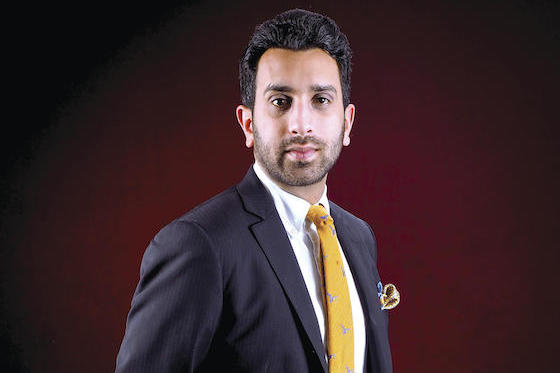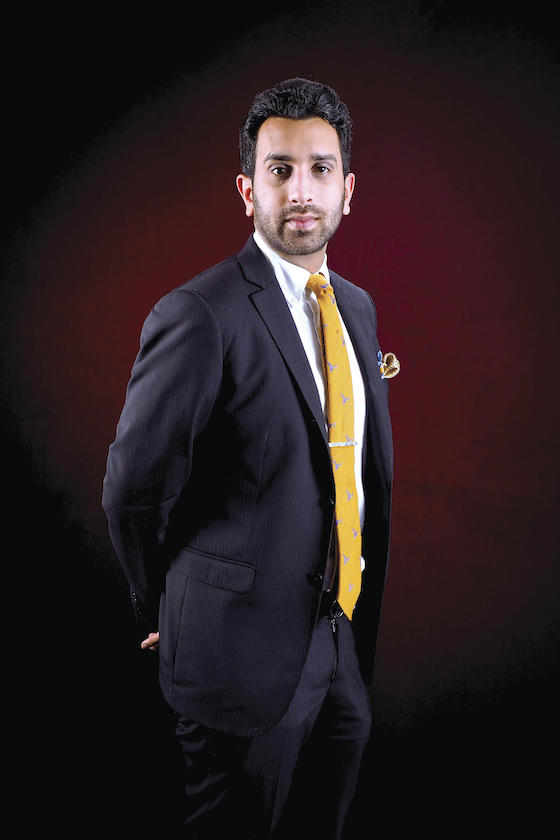Vivek Chadha is a man of restless energy. Only 30, he is the key driver behind the expansion of London-based hotel development company Nine Group, which over the past two years has become one of the fastest-growing private hotel companies in the U.K.
Graduating from university with a civil engineering degree, he got into the hotel business, like so many others, “by coincidence.” He shadowed a project manager working on a hotel and found it “more exciting than plain vanilla residential or commercial development.”

In 2011, at only 23 years old, he came across an unfinished hotel development in Watford, north of London. The original developers had gone bust and he managed to acquire it by raising money from the banking contacts of family and friends. The development now is a Holiday Inn.
He counts “convincing bankers to take on risky projects” as one of the greatest challenges he has overcome, along with starting the business during a period of recession, and planning and achieving continued growth in the face of Brexit, which already is creating staffing challenges for the hospitality industry.
Not a man to let such things stand in his way, just this March he founded Hotelhouse.co, a bespoke hospitality recruitment platform designed to reduce high staff turnover, increase retention, address the lack of suitable candidates and lower the high costs of hiring by allowing hoteliers to advertise their roles free of charge. The platform runs a strict qualifying process to be listed – a hotel must offer a minimum level of staff benefits and have a focus on employee wellbeing.
The Nine Group has acquired and developed 18 hotels over the past six years and employs over 900 people. It was founded on buying properties and developments out of administration. “Back in 2013, for two or three years it was possible to buy hotels valued around £25 million (US$35 million) for as little as £5 million (US$7 million),” Chadha says. Last year and going forward, the business strategy is less opportunistic and price-driven. He now focuses on development sites in key locations, which for Nine Hotels are airports, railway stations and city centers where corporations are located.
The business and corporate focus has resulted in a spin-off of residential serviced apartments and offices. At the two locations where Le Grove Serviced Apartments are available, his Holiday Inns at Watford Junction and Birmingham, they are part of the hotel building but have a separate entrance. The model is for a 100-key hotel plus 35 serviced apartments and Regus managed offices, which share the public areas, restaurant and gym facilities with the hotel.
He still builds commercial and residential real estate but says his heart, along with the business, is 90% in hotels. He works mostly with Hilton, IHG and AccorHotels for the corporate brand and sales and marketing muscle, while his management company operates the properties.

Nine Group aims to acquire and develop three or four hotels a year going forward. In 2018, it will open a Crowne Plaza at London Gatwick Airport, a Holiday Inn at the O2 Arena entertainment complex and a Doubletree by Hilton in Reading. The Novotel Heathrow opened in February is the flagship, tapping into the current vogue for community living in public?areas. “The hotel owner has to differentiate the product,” Chadha says.
Nine Group builds to the standards required by the brand but upscales to its own specification. Guests who come into the Novotel stop to take pictures of the lobby and post them on social media, according to Chadha, who is proud of the light and airy space they have created, unexpected in an airport hotel. “Guests are entering a space which is unique in its surroundings,” he says. “It has been designed with open areas where people play, socialize and interact. The style keeps guests in the public areas – they don’t go straight to their rooms. It has become an important hub – in fact, guests sleeping in other airport hotels use our lobby.”
Chadha is now looking to continental Europe for further opportunities. The group recently acquired Cartuja del Golf, a boutique hotel close to Marbella in southern Spain, and he says there is “huge scope” in leisure-based development on the Mediterranean coast and in Southern Europe, as well as in key business locations.
One of his influences has been the work and philosophy of Mahatma Gandhi, who concentrated his energy in the service of others. Chadha donated £100,000 (US$140,000) toward a statue of the Indian activist and civil rights campaigner unveiled in 2015 in London’s Parliament Square, alongside statues of Winston Churchill and Nelson Mandela. “I have been a follower of Gandhi most of my life and believe in his values both socially and in business,” he says.
In business he admires The Westmont Hospitality Group, which manages branded hotels across Canada, and he is inspired by the work of Indian-born businessman Surinder Arora, who has built a multimillion-dollar business out of airport hotels. “He has the ability to do transactions and deals – in fact he has done deals others could not manage,” he says. “Surinder has a real grasp on linking people who are in his network. Many people network but not many put it to good use.”
Chadha’s aim is to become one of the largest hotel owners and developers, in line with his personal philosophy that “everyone should be on a road to a final destination. A lot of people miss out key elements but the long-term approach is more important. For me it has always been about ‘what’s next?’”
